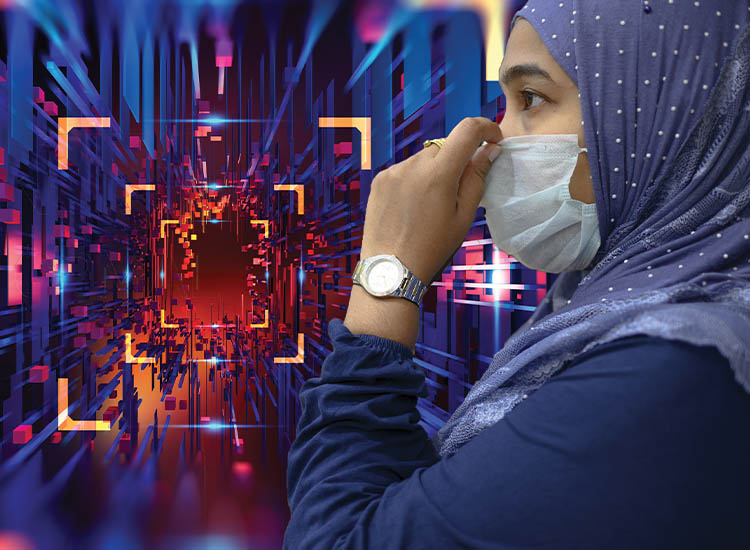
The pandemic has disrupted so many aspects of our lives and fast-tracked significant changes to security, what are the long-lasting implications for security for 2021 and beyond?
For a long time, security has been transitioning to a more behind-the-scenes role. While officers may be prominent for some businesses, much of the work was dependent on technology such as sensors and CCTV cameras. However, the COVID-19 pandemic has altered this.
When social distancing came into place, almost overnight, many retail centres and warehouses were left empty. With the often complex logistics of home working to be worked out where possible, many building managers did not have the time or capacity to also prepare a building to be left entirely empty long-term. Security officers, designated as key workers, became central to ensuring these buildings remained secure. While this work essentially remained behind-the-scenes, the re-opening of shops and offices has changed this completely.
We have already seen the more prominent role security officers have taken in many shops. In key outlets such as food suppliers, security officers were essential in ensuring that people remained civil and followed social distancing guidelines which often required customers to queue outside shops. Since more shops have opened and masks have become mandatory, officers are now ensuring everyone plays their part in minimising the risks posed by the pandemic.
Officers at the forefront
While security is vastly more than the officer on duty, the public is often unaware of this. Many, for the most part, will disregard the officer too. Essentially, security streamlines day-to-day activities and is only prominent when there is an incident such as a shoplifter. The pandemic might be the biggest incident of them all. Very rapidly, officers have been brought to the forefront of day-to-day functioning in retail and this is likely to last for a long while to come.
The pandemic has disrupted so much of what we previously took for granted and made many seemingly certain aspects of our lives suddenly unpredictable. In times like this, figures with some authority, such as security officers, can be a deeply reassuring presence. Those at higher risk or shielding someone at high risk will be reassured that if they feel at risk from someone who is failing to follow guidelines, there is someone to turn to. Though rare, there has also been disruption from people refusing to follow any guidelines and reacting angrily when confronted. Security officers provide the reassurance that any such disruption can be easily managed.
Security in 2021
Regardless of how long the pandemic lasts for, the way the public looks at socialising, shopping and day-to-day life may have changed forever. For many, the pandemic has been traumatic and settling back into life as it was before is simply not an option.
Security officers have always played an important role as a first point of contact in many public places but with tensions still high, they will need to use even more care and tact when talking to the public. Officers will likely continue to have additional front-of-house roles for as long as COVID-19 remains in the population.
Taking temperature checks and ensuring people are wearing masks will be the norm, and officers will need to be able to manage situations where people need to be turned away from a building. Whether because they have forgotten their mask or their temperature is too high, being turned away from a building will be enough to cause some people to become angry. Officers will need to manage these incidences with as little disruption to others as possible.
Soft skills will become more important in the security sector. Officers will be depended on not just to ensure that regulations are adhered to but also to be up to date on changing regulations. They will need to be able to explain these clearly and tactfully both to clients and to members of the public.
Security consultancy will likely become more important. This pandemic has not only disrupted individual lives; shops and businesses which were forced to close suddenly may have had a reminder of their own vulnerabilities. Buildings which are rarely closed and empty may not have prioritised certain security measures. Working closely with experts in security, organisations will be able to build resilience into their buildings where it was previously lacking.
Even if sudden re-closure is unlikely, working closely with experts will benefit many organisations in this turbulent time. Whether organisations are re-opening or in the process of implementing new safety measures, experts can guide and streamline the security elements of the process. Close partnership between organisations and security specialists will be central in ensuring the process runs smoothly and defining the remit of officers to implement measures for risk reduction.
Technology is also being developed to smooth the process. Thermal imaging cameras which can identify those with a high temperature, or cameras which can identify those not wearing a mask are being implemented. Touch-free access, such as scanning phone apps to unlock doors, is also being utilised. Sensors can be used to measure occupancy rates and ensure that areas do not become overcrowded and that large groups do not congregate.
Demonstrating value
It is undeniable that security officers have been vital in allowing life to continue through the lockdown and this was recognised by the government through the designation of security as key work. However, the economic hit that many shops and businesses have taken through closure will mean that those in the security sector will need to continuously demonstrate their value.
As many in the sector already recognise, the nature of security which means that ‘no one notices it until something goes wrong’ might tempt some organisations to cut costs on security measures without fully understanding the implications. The great irony of this is that those organisations with the best systems are often the most undervalued because risk is averted long before it becomes noticeable to the client.
Forming strong working relationships will be key in ensuring the importance of security is recognised. By talking through priorities with clients and understanding their needs, while also sharing experience, security provision can adapt to changing demands and risk profile.
Demonstrating expertise through an in-depth understanding of the current climate and sharing this with the client is one way of doing this. Technologically driven security and data-driven insights will play a major role in the coming years. The insights provided through data analysis can account for so many more variables than any expert and this can be a great reassurance to clients.
Regular updates on factors such as retail alerts will show the value of security systems. This is particularly important since the nature of criminal activity has adapted and evolved throughout the lockdown. Queues outside shops represent great opportunity for pickpockets and empty buildings can become locations for illegal gatherings.
Understanding these risks and how to manage them is part of the expertise firms will need to offer. Innovation must lead the growth of the sector. Clients will want the same reassurance as the public that expertise can guide them through this time of uncertainty and risk and, after all, those are areas that security specialises in.
There is a huge amount of potential for the security sector to grow and help its clients rebuild after the disruption of the previous months. However, showing clients that security is an investment, that pre-empting risk and training officers to a high level are the only means of providing an exceptional service, will be the real challenge.
Those in the sector which really thrive in 2021 and beyond will be the ones that can both demonstrate and communicate their value to their clients. The coming months and years will be an opportunity for the truly exceptional in the sector to stand out.
Darren Read
Managing director, Amulet
For further views on this topic, see related articles from our Police & Partnerships, Risk Management and Security Management categories, including:
Peter French on how the pandemic is accelerating change
Mike O’Neill on the new blended approach to working
Stephen Emmins from HIKVISION on how the security function is evolving
David Mundell – 2021 the year of opportunity
Neil Moscrop, CIS Security on the new roles for security officers

